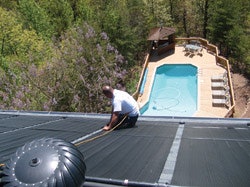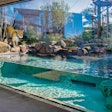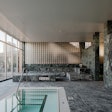
What was his first move? He didn't stop in at a pool store or dig up an old copy of the Yellow Pages. He fired up his computer.
He didn't know what type of heater he wanted; he just knew he wanted a warm pool. He read some things about solar and gas heaters and thought about it for a while.
"I first went the gas route," says Drew Nugent, recent purchaser of a new pool heater. "I had no idea what anything costs - I just poked around on the Internet, and then I stumbled on the solar stuff. It was all through Google searches. I was pricing everything out and comparing."
He liked the green idea behind solar, but what really piqued his interest was the fact that the operating costs were lower and it seemed like less hassle.
"Both heaters were fairly similar in cost," he says, "but the big kicker for me was that with a solar heater I don't have to be thinking, 'Should I turn the heater on? We just spent $100 on the gas bill, so maybe we shouldn't swim.'
"I didn't want to be thinking about gas prices, and I didn't want to be making decisions. I just wanted to turn it on and set the temperature and not think about it anymore.
"I had made up my mind to go solar by the time I actually picked up the phone. And I had a pretty good idea of what it would cost, and how it would work."
At this point, once he had decided on solar pool heating, the sale really came down to the name at the top of his Google search results - this was a local rep for a major manufacturer of solar pool heating products.
Now, it was the rep's sale to lose. And he didn't lose it. He didn't have to do any fancy dancing or strong-arming, just make it all work smoothly. Nugent wasn't going to move on to another supplier unless there was a reason to, and the rep didn't give him one.
"He didn't really sell me. He wasn't trying to convince me of anything, he just told me about the product. He didn't twist my arm; it was a very soft sell. Which was great."
Turn It Down
Nugent's Internet-guided journey to a final solution is very typical, says Jerry Kilgore, owner of Suncatcher of Atlanta. Kilgore started out back in 1983 doing installation work, but now runs the show from his Marietta, Ga., office.
"By the time they call me, a lot of them already understand what they're looking for. They've been researching it on the Internet. They know that the back of their house has plenty of sun, and they just want to know: 'Will it work or not?'"
Indeed, solar heaters are very unusual in that their sale is not entirely dependent on customer choice. If the site is poor in terms of layout or exposure to the sun, then no amount of customer enthusiasm can make the system work.
Kilgore turns down about 80 solar systems every year, for a variety of reasons. It's not easy to turn down a sale in hand, but it's smart business.
"I just tell them it won't work, and that they've got to look at a heat pump or gas because their roof is not in the right position for the sun or they've got tall pine trees blocking it, or their roof is shaped so you can't make it look nice. Those are situations that you've got to say no to."
In the long run, it's the right move, he says. "I don't want to push it on somebody if it won't work, because the last thing I want is somebody calling me up all year round because they don't like the way their heater is working."
Different Strokes
It's really about matching up the customer with the right product, adds Randy Budd, AQUA Hall of Famer and second generation owner of a family business, Budd's Pool Co., in Deptford, N.J. Solar may not be right in every situation, even if the home is well suited.
"At the end of the day, people buy heaters to have a heated pool," he says. "When I talk to customers, I ask them if they're spot heaters - which means they want the pool warm for four parties a year: Memorial Day, Fourth of July, Labor Day and maybe a graduation party. If that's really all you want, then you can buy a gas heater and save some money. (But trust me, your wife and kids are going to want a heated pool all the time.)"
There are all kinds of considerations that affect the selection of the right product. Some customers don't want 90-degree water or a swim season that extends into late fall, and therefore don't need a lot of heating power, Kilgore says.
"Some just don't want to swim that much. They want five or six months in the pool, that's all. And there are others that don't want the water really warm, they just want to knock the chill off the pool."
When Nugent weighed all the factors, his decision came down to this: The solar heater was about $1,000 more upfront, but after that, the gas heater would cost up to $500 a month, while the solar heater's operating costs would be negligible.
"It's a year and a half payback," he says. "And for me, that's a no-brainer. Yes, it was an extra $1,000 over the gas heater, but now I'm done."
Sometimes the best system for the homeowner is a combination of both solar and gas. Kilgore often installs solar systems alongside an existing gas heater, which can act as a backup. It's the best of both worlds.
"I may go to the home and find the gas heater is in fairly good shape," he says, "but they just can't afford the $300 to $500 bill. So I'll just make it into a hybrid, leave the gas heater in and add the solar.
"There's no sense in taking out the gas heater if it's in good shape because there may be time when you're looking forward to a birthday party or something and it rains, and now you can't get your pool temperature up in time. So you just fire up the gas heater."
Solar Yourselfers
There are two sides to the residential solar heating market; there are home-owners such as Nugent that are prepared to spend several thousand dollars for a trained installer like Kilgore to put in a large solar heating system. And there are also small-pool do-it-yourselfers looking to pick up something simple to take the cold, hard, early-summer edge off a small pool or aboveground.
Ryan Dunn, general manager, Pool Mart, Depew, N.Y., sells this type of item as an accessory to the above-ground pools which are a staple of his company's business. Ease of installation and convenience are keys to this market, he notes.
The retailer sells the GAME solar heater, which Dunn says attracts customers because it is particularly easy to set up and can be placed right beside the pool. "It is very compact," he says, "very easy for the customer to wrap their mind around. There's no climbing on the roof, and it doesn't require any creativity."
That depends on the customer, notes Eric Cassidy, vice president, Valley Pools in North Versailles, Pa. Some of his buyers will string four, five or even six of the units together, each one adding a few degrees of heat to the pool.
"We also sell bulk hose," he says, "and people will put one or more of these on top of a shed and run hose to it, even though it is designed to sit right by the pool. Sometimes, locating it right by the pool doesn't give you the most heating capacity. The best thing you can do with one of these is put it where it gets sunlight all day, sunup to sundown," he says.
Regarding performance, Cassidy says, "You'll get a few extra degrees on a sunny day. You can't expect rapid heat-up like you get with a gas, propane or electric heater, but in a week of sun, like this one, which is the hottest on record here since 2003, you'll definitely warm up your pool."
That little bit of warmth in the water can make the sale, he adds. "A few extra degrees is what people are looking for in this climate."
Comments or thoughts on this article? Please e-mail [email protected].












































